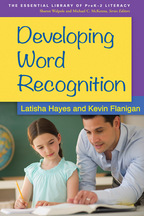Developing Word Recognition
Latisha Hayes and Kevin Flanigan
Paperbacke-bookprint + e-book
Paperback
orderSeptember 24, 2014
ISBN 9781462514151
Price: $38.00232 Pages
Size: 7" x 10"
A complete road map for word knowledge instruction in PreK-2, this book focuses on developing the word recognition and phonics skills identified in the Common Core standards for foundational skills. It offers clear-cut instructions for assessing students' stages of word knowledge development—emergent, beginning, or transitional—and their specific instructional needs. Chapters on each developmental stage are packed with effective learning activities and strategies, plus guidance for fitting them into the classroom day. Of special value, online-only appendices provide purchasers with more than 50 reproducible assessment and instructional tools, ready to download and print in a convenient 8½“ x 11” size.
This title is part of The Essential Library of PreK-2 Literacy series, edited by Sharon Walpole and Michael C. McKenna.
“Without doubt, this is one of the most practical and useful books that I've seen on word knowledge instruction. The authors supply instructional toolkits—tailored to the developmental needs of students—that target reading, writing, and manipulating words, as well as transferring word knowledge to contextual reading and writing. They present critical information about the interconnectedness of reading, writing, and word recognition in a balanced literacy framework. This is a valuable guide for classroom teachers with many examples to help plan instruction.”
—Mary Napoli, PhD, School of Behavioral Sciences and Education, Penn State Harrisburg
“Hayes and Flanigan provide all the necessary materials for a teacher to determine students' needs and design a course of instruction specific to each individual. They explain both the 'whys' and the 'hows' of high-quality word knowledge instruction. I recommend this book to anyone who wants to fully understand the reading–spelling connection across each developmental stage. Teachers who utilize the toolkits in this book will doubtless see gains in their students' word knowledge.”
—Alisha Demchak, MEd, kindergarten teacher and reading specialist, Burnley-Moran Elementary School, Charlottesville, Virginia
“In this highly readable, efficiently organized volume, Hayes and Flanigan provide an excellent foundation for helping PreK-2 learners develop the skills that will make them readers. After following the step-by-step instructions for administering, scoring, and interpreting a pre-assessment, teachers may then choose which subsequent chapters to turn to in order to individualize instruction based on students' developmental levels. The resources and toolkits of teaching strategies make Developing Word Recognition an ideal resource for preservice and practicing teachers.”
—April Whatley Bedford, PhD, Department of Curriculum and Instruction, University of New Orleans
“The authors' integrative perspective will be welcomed by teachers ready to move beyond the common practice of teaching spelling in isolation from authentic reading and writing. Hayes and Flanigan bring a fresh model for assessing students and teaching them to be word experts through the idea of the word knowledge zone. Rather than offering a 'magic bullet,' Developing Word Recognition expands teachers' knowledge of word recognition development and helps them make thoughtful and strategic decisions about instruction. I am very excited to share this book with our teachers.”
—Stephanie Tatel, MAT, MEd, literacy specialist/instructional coach, Mary Carr Greer Elementary School, Charlottesville, Virginia
Table of Contents
1. An Introduction to Word Recognition: What You Need to Know about How Words Work2. Assessing Word Knowledge: A Comprehensive Look at the Word Knowledge Zone
3. The Emergent Reader and Writer: Building Foundational Skills That Facilitate Word Learning
4. The Emergent Reader’s Toolkit: Activities and Student Strategies
5. The Beginning Reader and Writer: Building a Bank of Known Words
6. The Beginning Reader’s Toolkit: Activities and Student Strategies
7. The Transitional Reader and Writer: Building Automatic Word Knowledge for Fluency
8. The Transitional Reader’s Toolkit: Activities and Student Strategies
About the Authors
Latisha Hayes, PhD, is Clinical Assistant Professor in the Department of Curriculum, Instruction, and Special Education at the University of Virginia, where she teaches courses on the diagnosis and remediation of reading difficulties. She also works with preservice and inservice teachers at the McGuffey Reading Center, which provides students across the grades with diagnostic and tutoring services. As a special educator and reading specialist, Dr. Hayes has taught students with reading disabilities in the primary through middle grades. Her interests have focused on supporting struggling readers through university-based programs and partnerships.Kevin Flanigan, PhD, is Professor in the Literacy Department at West Chester University of Pennsylvania (WCU). He works in the WCU Reading Center along with master's students to assess and teach children who struggle to read and write. A former middle-grades classroom teacher and reading specialist/coach, Dr. Flanigan researches and writes about developmental word knowledge and struggling readers.
